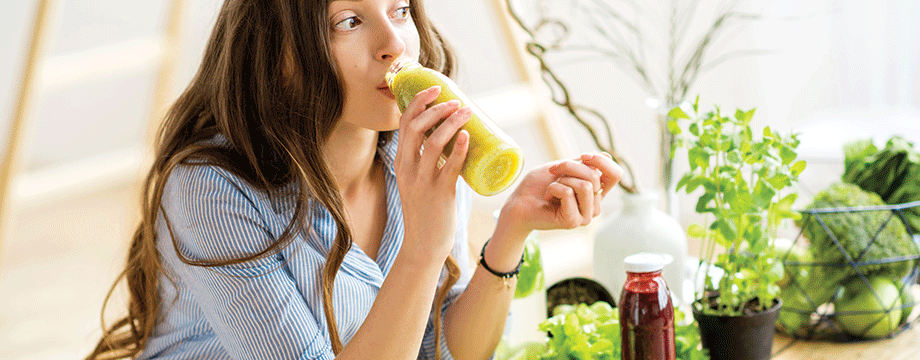Lockdown food & drink

Vitamin-packed smoothies, fermented foods for gut health, perfect proteins and healthy snacking - so that you can eat and drink well through the global crisis
At a time when buying food has never been so stressful, it has never been so important to eat well. The bad news is that while many of us are stuck at home, and close to the kitchen, there may be temptations in the form of biscuits, crisps and chocolate bars lying in wait. These may seem to perk you up, but are followed by an energy slump, leaving you fatigued and craving more.
Fortunately, Irish independent health stores are still trading and this is where you will find a focus on whole, real food providing healthy nutritious snacks. For those who are avoiding certain food groups such as gluten or dairy, or those who wish to make organic choices and eat foods without preservatives this is the place for you.
Ideally you want to look for snacks which offer good quality protein, healthy fats and anti-oxidant power. These are generally found in wholegrains, nuts, seeds, avocado, olives, fresh fruit and vegetables. Ask for advice and read labels to ensure foods do not contain artificial colourings, flavourings and sweeteners or high levels of salt and sugar.
Perfect proteins
“Protein is essential to life and plays a vital role in so many bodily functions from structure to hormone, immunity and DNA replication,” says Grace Kinirons, onsite nutritionist with health store Nuts and Grains in Mullingar, Co Westmeath. “Increasing plant-based protein in your diet not only provides amino acids but extra valuable vitamins, minerals and fibre to fuel your day as well as helping the planet. Plant-based proteins include nuts, pulses, lentils and high protein grains; plant-based protein powders; nut butters; plant-based milks, yoghurts and snacks; fresh or frozen tempeh and tofu.”
“I enjoy nut and seed-based snack foods,” says Hannah Dare from health store and café Organico in Bantry, Co Cork, “and health food shops are great places to find healthy low sugar snack bars and bags of organic great quality nuts.”
Power packed smoothies
“I’m a big fan of starting the day with an energy-boosting smoothie,” says Hannah Dare. “It has to be super quick to make, so I alternate between using a green powder blended with a plant-based milk, a handful of nuts or seeds, some hemp seed oil, a banana and some frozen berries. Sometimes I make enough for two days and keep it in the fridge.”
“Smoothies can be a very versatile and easy method of increasing your nutrient intake and providing a healthy ready-made meal,” says Grace Kinirons. “You can include herbs and spices, pre and probiotics or seaweeds. You can also add pre-mixed nutrient-dense powders containing nuts and seeds, plant proteins, green food mixes, antioxidant mixes or powders containing maca or mushroom. The base for your smoothie should contain more vegetables than fruit, as too much fruit sugar entering your digestive system in an easily digested form will stimulate a rise in insulin production.”
Fermented foods
“Ensuring we eat fermented foods will supply a daily dose of pre-biotics and a broad-spectrum range of beneficial bacteria to support and re-balance the immune system in the gut,” says Grace Kinirons. “The fermentation process also acts as a pre-digestion phase, making nutrients more bioavailable to the body. Fermented foods to include in your day include: sauerkraut – a finely cut fermented cabbage rich in vitamins C, B and K and probiotics; kefir – that can be made from milk, dairy-free milks or water, though milk kefir is thought to have the best probiotic profile; kombucha – made from a SCOBY (symbiotic colony of bacteria and yeast) and various other components including black, green or redbush tea.”
“We love water kefir,” says Hannah Dare. “It’s incredibly refreshing, and gives you a great probiotic boost. We make our own in our cafe, just for sale in-house.”
Functional foods
“Functional foods are purported to offer bioactive components such as antioxidants, vitamins, minerals, pre- and probiotics that may exert a therapeutic benefit,” says Grace Kinirons. “Functional foods found in your health food shop include:
- Green foods such as chlorella, spirulina wheat grass, barley grass, broccoli powder and kale powder are rich in amino acids, vitamins, minerals and phytochemicals.
- Prebiotic foods such as whole nuts or seeds, dried fruit, particularly figs and dates, wholegrains or inulin and chicory powder.
- Sea vegetables and seaweeds such as dulce, nori, kelp and kombu are rich in vitamins and minerals (particularly B12 and iodine), soluble fibre and amino acids.
- Mushroom powders that contain powerful immune modulators such as reishi, shitake, cordyceps, lion's mane or chaga.
- Omega-3-rich foods such as milled flaxseeds, hemp seeds, chia seeds and walnuts to help modulate inflammation.”
“Hemp juice is a natural whole plant source of CBDa, along with phyto-nutrients, omega oils and has all the alkalising benefits of green juices,” says Hannah Dare. “It’s calming and energising at the same time, which is a lovely combination for modern living.”
More Rude Food articles...
Articles from our latest issue...